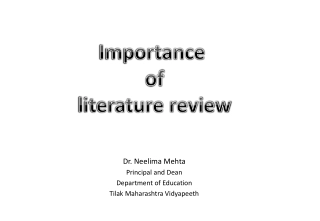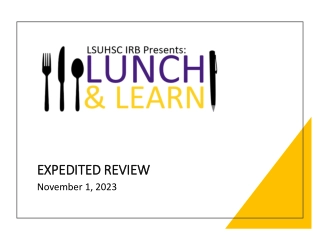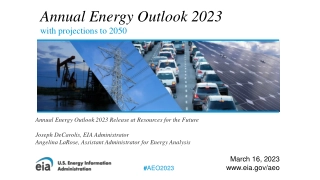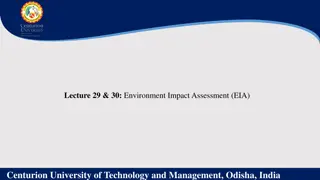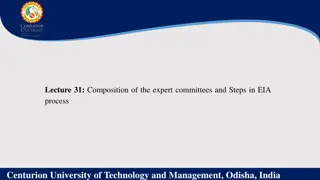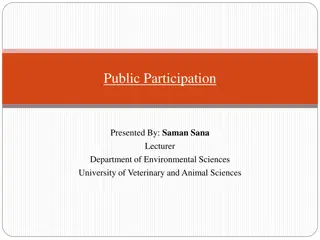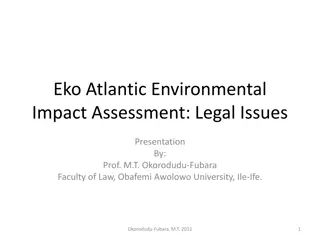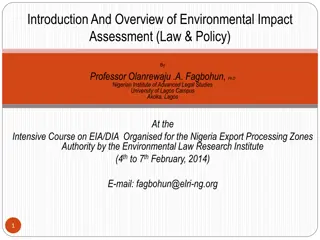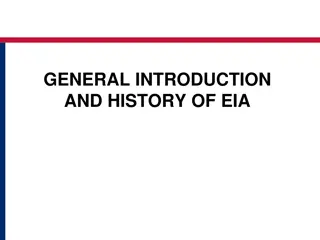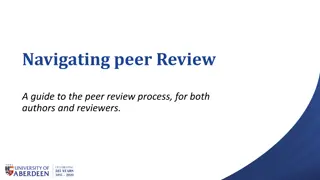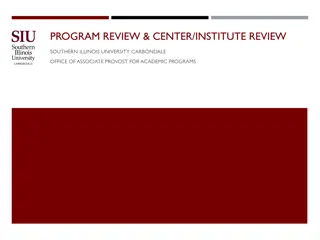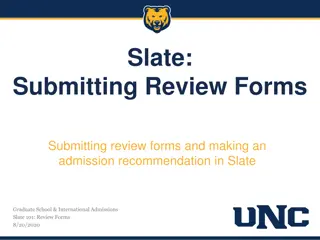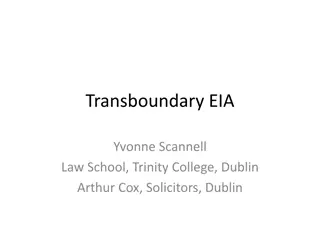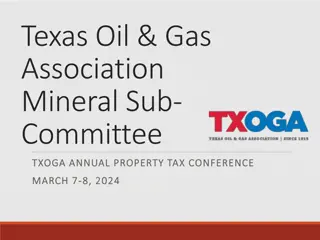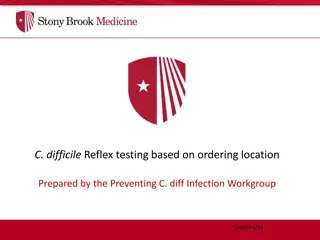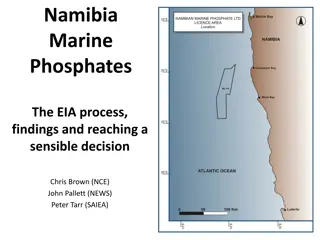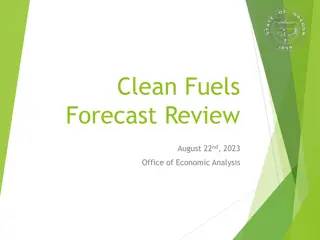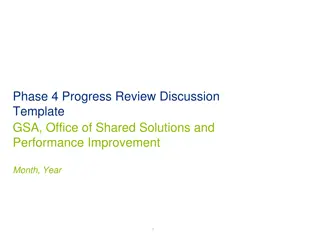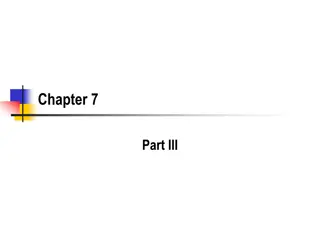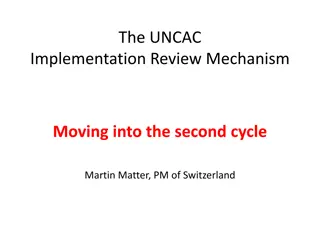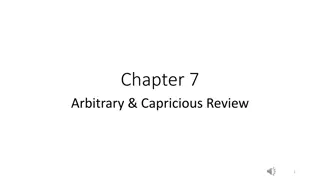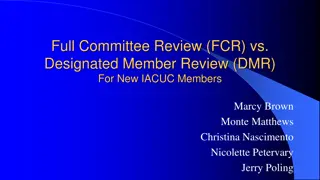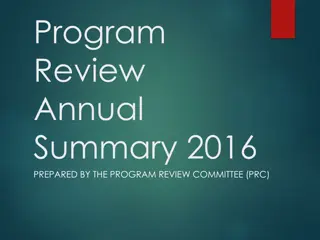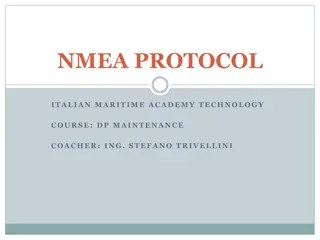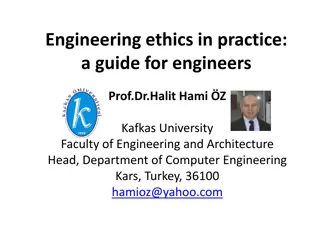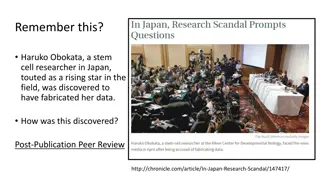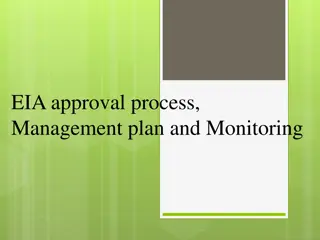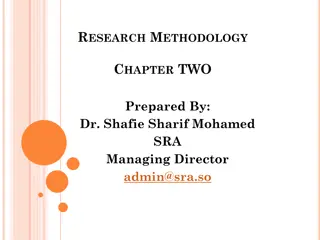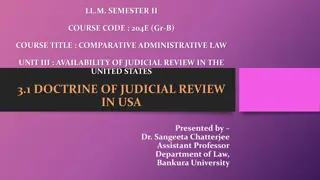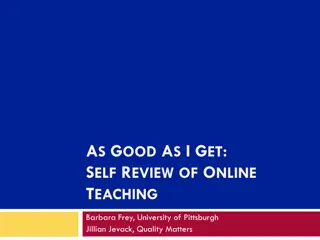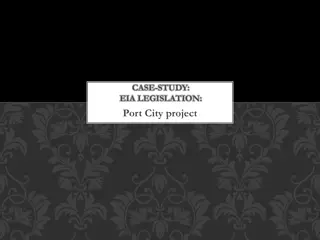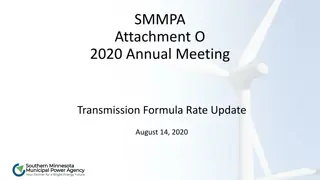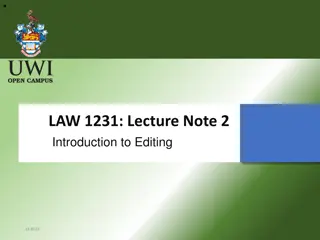Importance of literature review
A literature review is a critical component of any research endeavor, providing a comprehensive analysis of existing knowledge in a particular field. This review helps in clarifying conceptual issues, understanding research design, persuading examiners, and contributing new insights to the subject a
0 views • 28 slides
Understanding IRB Review Process for Expedited Research
Learn about the significance of IRB review, levels of review, and categories of expedited review. Discover the criteria for IRB review, including whether the study involves human subjects and contributes to generalizable knowledge. Explore the different levels of IRB review and the specific categori
4 views • 11 slides
Annual Energy Outlook 2023
The U.S. Energy Information Administration (EIA) releases the Annual Energy Outlook 2023 with projections to 2050, exploring long-term energy trends in the United States. The report includes different cases with varying assumptions, such as economic growth, oil prices, and zero-carbon technology cos
2 views • 25 slides
Environmental Workshop Overview: Ministry of Environment in the Solomon Islands
The Environment and Conservation Division (ECD) of the Ministry of Environment, Climate Change, Disaster Management, and Meteorology in the Solomon Islands focuses on sustainable environmental management, conservation, and protection of natural resources. The ECD's vision is to safeguard the environ
1 views • 15 slides
Rapid Review of BSL Commissioning Arrangements by Dr. Michael Brady
NECS commissioned a Rapid Review of British Sign Language (BSL) service provision to identify areas for improvement in access and patient experience, especially during the Covid-19 pandemic. The review focused on stakeholder engagement, options appraisal for commissioning responsibility, and recomme
9 views • 19 slides
Environmental Impact Assessment (EIA) Evolution and Importance at Centurion University
The Environmental Impact Assessment (EIA) process evaluates the environmental impacts of proposed projects, aiming to minimize adverse effects. Originating in the 1970s, EIA has evolved globally, becoming a key policy tool for sustainable development. In India, EIA began in 1976-77 and was later mad
0 views • 4 slides
Steps in the EIA Process at Centurion University, Odisha, India
The Environmental Impact Assessment (EIA) process at Centurion University involves crucial steps such as screening, scoping, baseline data collection, impact prediction, mitigation measures, public hearing, decision making, and monitoring. It is a cyclical process that requires thorough assessment o
0 views • 4 slides
Enhancing Environmental Impact Assessment Through Public Participation
Public involvement in the Environmental Impact Assessment (EIA) process is crucial for obtaining valuable insights, reducing conflicts, and improving decision-making transparency. This involvement aims to inform stakeholders, consider alternatives, and maximize benefits while addressing concerns. Ke
0 views • 28 slides
Eko Atlantic Environmental Impact Assessment and Legal Issues Presentation
Prof. M.T. Okorodudu-Fubara from Obafemi Awolowo University presents on the Eko Atlantic Environmental Impact Assessment, focusing on legal requirements, the EIA process, preemptive measures, violations, and vital laws applicable to the project. The presentation outlines the planned project to dredg
0 views • 20 slides
Environmental Impact Assessment: Concepts, Principles, and Applications
This presentation by Professor Olanrewaju A. Fagbohun provides an in-depth overview of Environmental Impact Assessment (EIA) and Development Impact Assessment (DIA), highlighting their roles in environmental management and planning. The clarification of concepts such as EIA and DIA, along with guidi
0 views • 26 slides
Comprehensive Environmental Impact Assessment Checklist
This comprehensive checklist provides guidance on gathering baseline data across key categories for Environmental Impact Assessments (EIA). It covers aspects like air quality, climate, ecology, biodiversity, and the human environment, offering detailed descriptions for each category.
0 views • 9 slides
Evolution of Environmental Impact Assessment (EIA) and its Significance
EIA began in response to environmental crises in the 1960s due to population growth, industrialization, and urbanization. Developing countries also face severe environmental challenges, necessitating EIA adoption. The history and reasons for EIA implementation are outlined, emphasizing the global im
2 views • 49 slides
Enhancing EIA Systems: Role of International Communities
This detailed report discusses the importance of international communities in strengthening Environmental Impact Assessment (EIA) systems. It covers key review areas, criteria, stakeholder participation, and the quality of predicted impacts and mitigation measures. Recommendations are provided for i
1 views • 12 slides
Understanding Impact Analysis in Environmental Sciences
Impact analysis, presented by Saman Sana, explores the importance of identifying and evaluating environmental changes resulting from project implementation. The Environmental Impact Assessment (EIA) process involves screening, scoping, impact analysis, and prediction phases to forecast and evaluate
0 views • 36 slides
Navigating Peer Review: A Comprehensive Guide for Authors and Reviewers
In academic publishing, peer review plays a crucial role in maintaining publication quality. This guide offers a detailed overview of the peer review process for both authors and reviewers, covering topics such as receiving review invitations, manuscript submission, writing effective reviews, and mo
0 views • 31 slides
Southern Illinois University Carbondale Office of Associate Provost for Academic Programs Review
The Program Review & Center/Institute Review at Southern Illinois University Carbondale aims to educate attendees on IBHE requirements, the review process, conflict of interest policies, self-study writing, on-site review involvement, financial support, and available resources. The IBHE mandates rev
0 views • 37 slides
Slate Graduate School & International Admissions Review Forms Overview
Explore the process of submitting review forms and making admission recommendations in Slate Graduate School & International Admissions, including automatic assignment of applications to queues, review of Staff Review Forms, and recommending admission or denial through Faculty Review Forms. Learn ab
0 views • 8 slides
Transboundary Environmental Impact Assessment for Greenstar Development
The Transboundary Environmental Impact Assessment (EIA) conducted for the Greenstar Development project involving EU Member States A and B reveals potential environmental impacts like soil and waste deposition, polluted dredging material transfer, and altered currents affecting wetlands and flooding
0 views • 7 slides
Texas Oil & Gas Association Mineral Sub-Committee Annual Property Tax Conference
The Texas Oil & Gas Association Mineral Sub-Committee is organizing its Annual Property Tax Conference on March 7-8, 2024. The committee members will discuss valuation parameters, Circuit Breaker Legislation, and meet with Appraisal Firms to summarize discussions. They will also review Texas Product
0 views • 25 slides
Management of C. difficile Infection Testing and Treatment Protocol
Stony Brook has implemented a two-step testing algorithm for C. difficile infection using PCR and EIA tests to differentiate between active infection and asymptomatic carriage. Positive PCR results are further tested with EIA. The protocol includes criteria for CDI testing, specimen collection guide
0 views • 5 slides
Understanding Marine Phosphate Mining in Namibia: EIA Process, Findings, and Decision-Making
Explore the complexities surrounding marine phosphate mining in Namibia, focusing on the Environmental Impact Assessment (EIA) process, key findings, and the challenges in reaching a sound decision. Delve into the global overview of seabed mining, the significance of EIA, and the broader recommendat
0 views • 32 slides
Clean Fuels Forecast Review - August 22nd, 2023 Summary
Reviewed in this forecast are the Committee's discussions on major policy changes and proposals, including Advanced Clean Cars I & II, Clean Trucks Plan/Rules, Bipartisan Infrastructure Law, Inflation Reduction Act, Washington Clean Fuel Standard, and Portland Renewable Fuel Standard. The Oregon Dep
0 views • 29 slides
Phase 4 Progress Review Discussion Template Overview
This template guides a Progress Review discussion involving a Customer, Provider, and Key Stakeholders. It addresses the gaps in common business requirements, risk assessment confidence, deployment readiness, budget impacts, migration costs, and more. The template provides instructions for completin
0 views • 25 slides
Overview of Environmental Impact Assessment and Strategic Environmental Assessment Directives
Environmental Impact Assessment (EIA) and Strategic Environmental Assessment (SEA) play crucial roles in evaluating the impact of planned activities on the environment. This content delves into the concept, origins, development, and key elements of environmental assessment, discussing the legal fram
2 views • 35 slides
Understanding Judicial Review in Administrative Law
In this chapter, the concept of judicial review in administrative law is explored, focusing on the scope of review set by Congress, including trial de novo and independent judgment on evidence. Different standards of review, such as clearly erroneous and substantial evidence, are discussed, highligh
0 views • 23 slides
UNCAC Implementation Review Mechanism: Moving Towards the Second Cycle
The UNCAC Implementation Review Mechanism is progressing into its second cycle, with a focus on evaluating challenges and terms of reference at the conclusion of each review cycle. The performance assessment has highlighted achievements in enhancing awareness and involvement of civil society/private
0 views • 7 slides
Understanding Arbitrary and Capricious Review in Administrative Law
Arbitrary and Capricious Review refers to a highly deferential standard applied to agency decisions, requiring agencies to demonstrate compliance with statutory requirements. The landmark case of Citizens to Preserve Overton Park v. Volpe set the precedent for a thorough judicial review based on the
0 views • 8 slides
Global Peer Review Activities and Future Plans Overview
This document highlights the recent peer review activities conducted by the Subcommittee on Peer Review, focusing on the accomplishments and upcoming plans for enhancing peer review processes. It includes insights from the Global Flyer Survey, training programs, and the development of guidelines, al
0 views • 3 slides
Understanding Full Committee Review (FCR) vs. Designated Member Review (DMR) for New IACUC Members
Explore the differences between Full Committee Review (FCR) and Designated Member Review (DMR) for new IACUC members. Learn the acceptable methods of protocol review, federal requirements, member responsibilities, risks, and best practices for protocol approval. Dive into the two valid methods of IA
1 views • 23 slides
Program Review Annual Summary 2016 by PRC Committee
The Program Review Annual Summary 2016, prepared by the Program Review Committee (PRC), presents a detailed review of instructional programs and administrative units at the College. The report outlines the purpose of the annual review, the themes and issues identified, and recommendations for improv
0 views • 13 slides
Understanding NMEA Protocol in Maritime Technology
The NMEA Protocol, defined by the National Marine Electronics Association (NMEA), sets standards for communication among marine instrumentation. NMEA 0183, a key standard, establishes electrical interfaces in marine electronics. Additionally, NMEA 2000 introduces a new standard for shipboard electro
1 views • 15 slides
Ethics in Engineering Practice: Staying Within Your Limits
Environmental Impact Assessment (EIA) specialist engineer approached for a project exceeding his competency level. While competent in most aspects, the engineer lacks expertise in traffic impact assessment. He must decide whether to proceed personally or recommend hiring a specialist, balancing ethi
0 views • 47 slides
Uncovering Fabricated Data in Stem Cell Research: The Haruko Obokata Scandal
Haruko Obokata, a promising stem cell researcher in Japan, faced allegations of data fabrication, leading to a significant research scandal. Post-publication peer review platforms like PubPeer, PubMed Commons, F1000 Research, and ResearchGate Open Review play vital roles in detecting and addressing
0 views • 11 slides
Key Aspects of Environmental Impact Assessment (EIA) Review Process
The Environmental Impact Assessment (EIA) review process plays a crucial role in evaluating the environmental, social, and economic impacts of proposed projects. It involves assessing the adequacy of reports, ensuring stakeholder involvement, and verifying the sufficiency of information for decision
0 views • 29 slides
Effective Strategies for Conducting a Literature Review in Research Methodology
Understanding the importance of literature review in research methodology, this chapter discusses the objectives, aims, and guidelines for writing a comprehensive literature review. It emphasizes the significance of identifying gaps in existing knowledge, structuring the review, and organizing infor
0 views • 33 slides
Understanding the Doctrine of Judicial Review in the United States
Judicial Review is a crucial power of the judiciary to review the constitutionality of laws and executive orders. This article explores the origin of Judicial Review in the United States, focusing on the landmark case of Marbury v. Madison. It delves into the concept, importance, and application of
0 views • 14 slides
Enhancing Online Teaching Through Self-Review: Challenges and Benefits
Explore the self-review process of online teaching, including identifying challenges, benefits, and different types of reviews. Learn about developing an effective review guide, promoting collegiality, and facilitating professional development in online teaching. Discover the components of a review
0 views • 23 slides
Environmental Impact Assessment Legislation for Port City Project
This case study delves into the Environmental Impact Assessment (EIA) legislation surrounding a Port City project. It discusses the prediction of environmental consequences, challenges such as natural resource constraints, and measures to ensure the project is environmentally sustainable. The study
0 views • 22 slides
SMMPA Annual Meeting - Transmission Rate Update Summary
SMMPA, a not-for-profit serving Minnesota municipal utilities, provides power through its transmission assets. The organization annually establishes rates for open access use of its assets. The Attachment O historical template, approved by FERC, utilizes data from EIA 412 for this purpose. Key dates
0 views • 8 slides
Peer Review Process in Academic Editing
Explore the importance of peer review in academic and professional development, focusing on improving writing skills and critical evaluation. Learn about the benefits of peer review, ways to effectively review work, and various modes of assessment. Understand the peer review process and how it enhan
0 views • 29 slides
